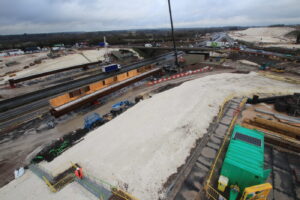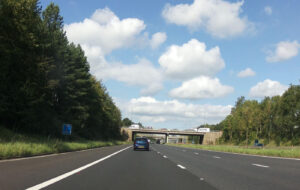The last year has seen National Highways’ significantly reduce emissions across its business and operations.
Achievements recorded in the last year include ensuring that 100% of its own energy is sourced from renewable energy, converting 38% of its vehicle fleet to greener plug-in hybrid cars and using lower-carbon LED bulbs to light more than 16% of the strategic road network (SRN).
These figures are taken from a new National Highways report Net zero highways: our 2030 / 2040 / 2050 plan Progress report 2021-2022.
It said that corporate emissions have fallen from 82,150 tCO2e in the National Highways baseline to
26,300 tCO2e during 2021-22.
“The main change is because we now buy all our electricity from renewable sources backed by a certified Energy Attribute Certificate. We see action to decarbonise electricity as part of a hierarchy of activities. This means we are also focused on energy efficiency and our own renewable generation. Emissions have also fallen in all other corporate categories other than buildings gas. This has increased due to office
re-occupation following the COVID-19 lockdowns,” said the report.
Meanwhile, maintenance and construction emissions have fallen from 733,500 tCO2e in its baseline, to a modelled 523,000 tCO2 e during 2021-22. Suppliers reported to National Highways that they emitted 295,617-347,104 tCO2e from their activities in 2020-21.
“Our data improvement plan will align how we measure and report these emissions. Much of the decrease in our modelled emissions is due to the re-timing of some of our schemes to later in this Road Period up to 2025. The reduction is also due to innovative work that we are starting on lower carbon materials,” said the report.
Also, 93% of traffic officers have been trained to better support motorists with electric vehicles and freight platooning trials designed to lower emissions from HGVs have been completed on the network for the first time.
The report said that the last 12 months had represented a “promising start” to the strategy while acknowledging that there was “still much to do”.
The 4,300-mile SRN is one of the country’s most critical pieces of infrastructure, directly supporting more than 64,000 jobs and delivering £314 billion to the economy. Operating, maintaining and using the network does come at a cost, with the SRN being a major source of carbon emissions.
However, vehicle emissions are expected to decline rapidly as electric power replaces petrol and diesel propulsion in the coming years. National Highways has a long-term vision to capitalise on the latest technologies and new ways of working to decarbonise the network as quickly as possible.
Steve Elderkin, Director of Environmental Sustainability at National Highways, said: “Over the last year colleagues across National Highways and our supply chain have been turning this plan into a reality.
That’s what this requires; a huge joint effort across our industry, supported with the right policies. I am encouraged because I see good decisions being made and we’re moving in the right direction. This has built the foundations of the programme that will deliver our targets, moving us forward as outlined in this progress report.”
A trial programme to provide the use of electric vans to businesses, charities, community groups, the NHS and taxi drivers has been utilised 800 times to date
Today’s publication provides an insight into National Highways’ achievements in the last year against the plans set out in 2021’s net zero report. It says:
- National Highways remains on track replace 70 per cent of road lighting with LEDs by 2027, with over 16 per cent already upgraded;
- 38 per cent of traffic officer vehicles have already been converted to plug-in hybrids, capable of being run in part on battery power, with 100 per cent conversion expected by 2030;
- Work is ongoing to start construction of the first totally net-zero road enhancement scheme, with a series of pilot schemes being initially developed before the project starts by 2030;
- Low-carbon materials have been introduced by project teams as part of the shift towards zero carbon steel, cement, concrete and asphalt by 2040. In the last year, this has included the use of Aggregate Industries’ “Super Low-Carbon” asphalt on the A590 Cross-A-Moor scheme in Cumbria, and a trial of low-carbon reinforced concrete at junction 6 of the M42;
- Work is continuing to support the development of “Project Rapid” which aims to deliver £950 million of electric car charging infrastructure at motorway service areas, including six high-powered chargers at each location by 2023;
- Some £200,000 has been invested in training and new equipment such as plastic skates and battery boosters to help traffic officers move “non-rolling” broken-down vehicles – including electric vehicles – to a safe place;
- A trial programme to provide the use of electric vans to businesses, charities, community groups, the NHS and taxi drivers has been utilised 800 times to date, helping to break down barriers towards the adoption of zero-emission deliveries in towns and cities.
net-zero-highways-progress-report-2021-2022.pdf (nationalhighways.co.uk)
























